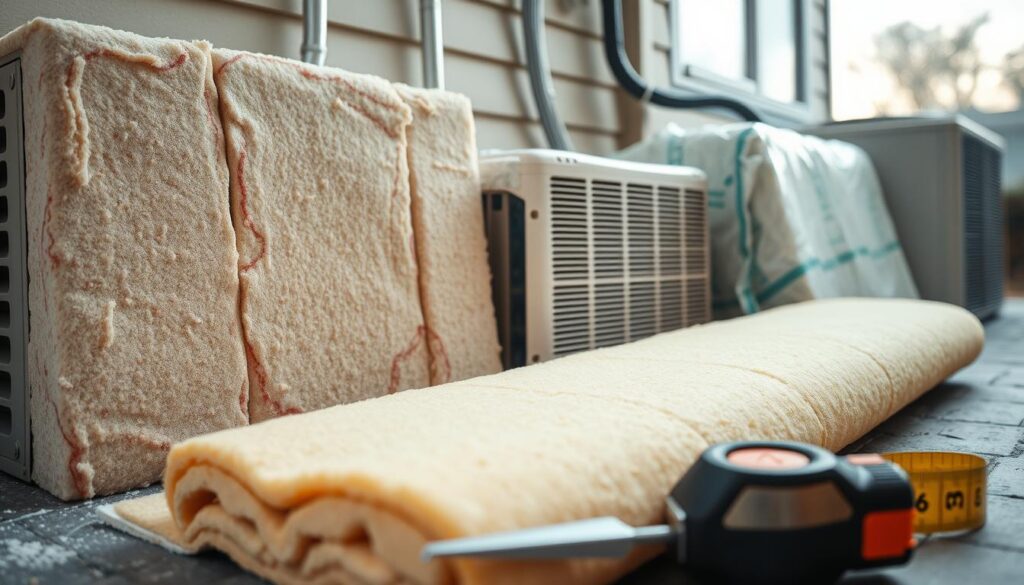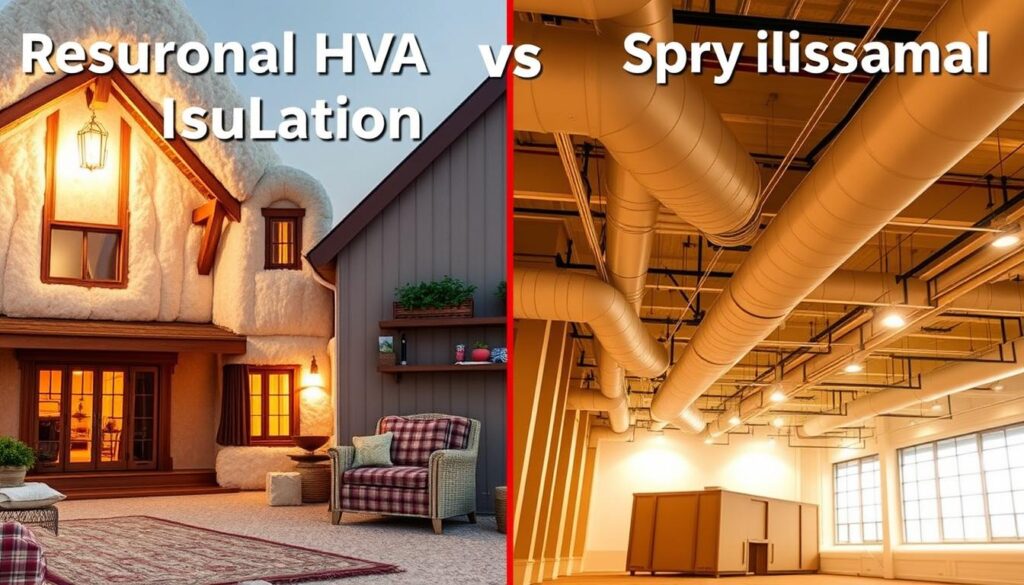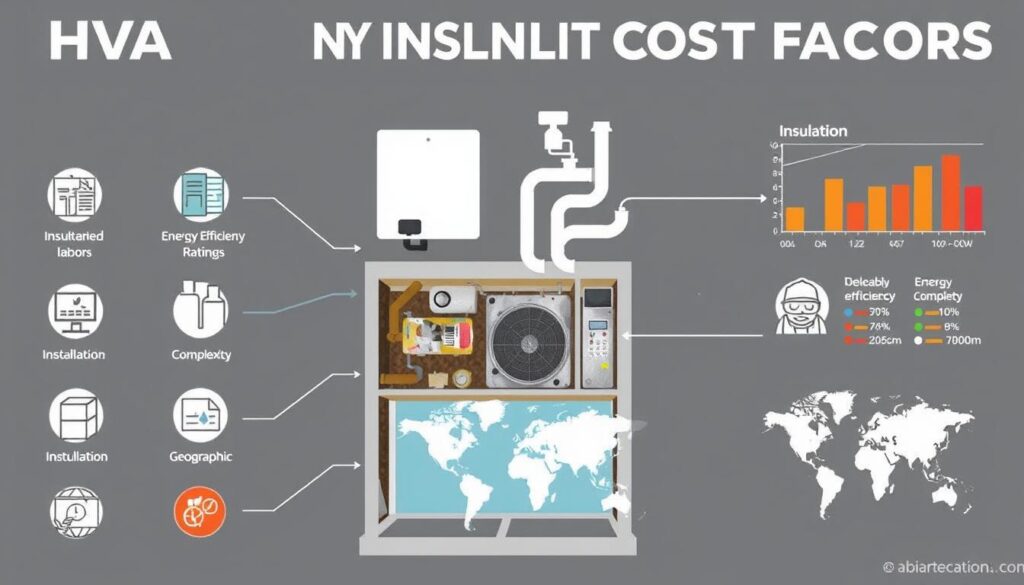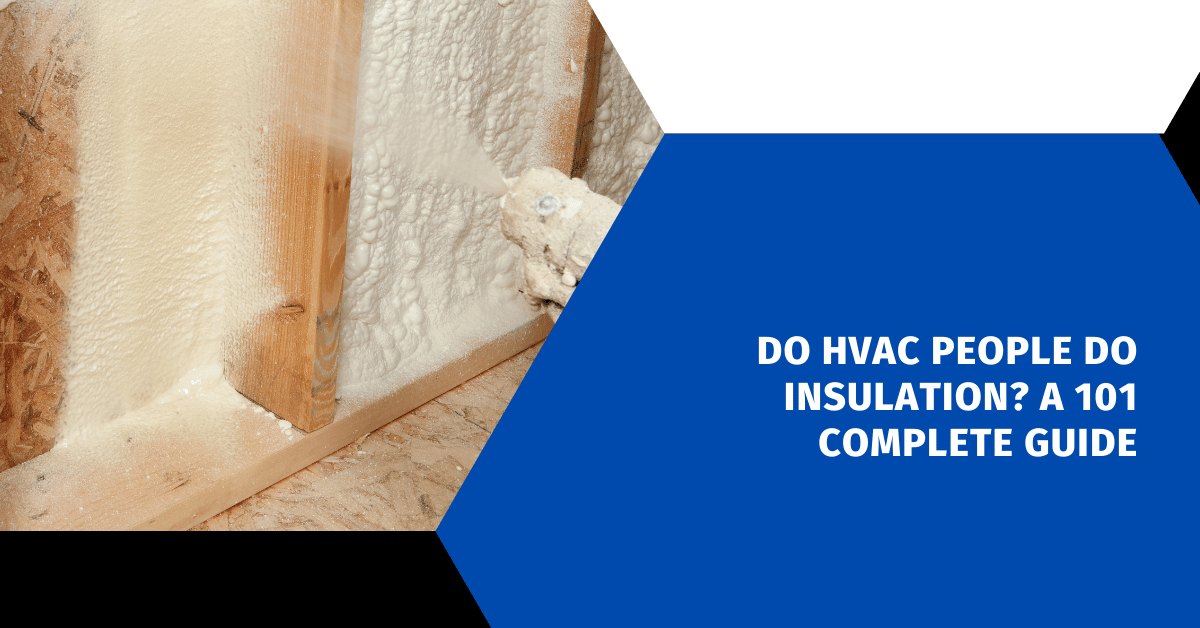Affiliate Disclosure
HVAC Guide Guys is a participant in the Amazon Services LLC Associates Program, an affiliate advertising program designed to provide a means for sites to earn advertising fees by advertising and linking to Amazon.
Do HVAC People Do Insulation? Are you curious if HVAC pros can do insulation too? HVAC and insulation are closely linked. This guide will show how HVAC experts play a key role in insulation. We’ll also look at the types of insulation used in HVAC systems and how they boost energy efficiency and comfort.

Key Takeaways
- HVAC pros often offer insulation services as part of their skills
- Good insulation is key for HVAC systems to work well and save energy
- Insulation types like fiberglass, mineral wool, and foam boards are used in HVAC
- Ductwork insulation can make air quality better and cut energy costs
- Getting insulation installed by pros is important for best results
Table of Contents
Understanding HVAC Professionals and Their Services
HVAC (Heating, Ventilation, and Air Conditioning) experts are key to keeping homes and businesses comfortable. They do more than just HVAC work. They also play a big role in insulation.
Core HVAC Services and Expertise
HVAC technicians handle many tasks. This includes installing, maintaining, and fixing heating, cooling, and ventilation systems. They know a lot about different HVAC systems, like furnaces and air conditioners.
They can find and fix problems. This ensures these systems work well.
The Connection Between HVAC and Insulation Work
HVAC and insulation go hand in hand. Good insulation helps HVAC systems work better. On average, 20-30% of heating and cooling power is lost in homes across America due to air loss.
By working with insulation experts, HVAC techs help save energy. They make sure homes and businesses stay comfortable and energy-efficient.
Professional Certifications and Training
HVAC pros get special training and certifications. This includes insulation work, especially on duct systems. These certifications show they know a lot about insulation.
This training lets them do both HVAC and insulation work well. It ensures they give their clients the best service.
| Service | Expertise | Certifications |
|---|---|---|
| HVAC Installation and Repair | Furnaces, air conditioners, heat pumps, ductwork | NATE, HVAC Excellence, EPA Section 608 |
| Insulation Services | Duct insulation, attic insulation, wall insulation | BPI, RESNET, CSIA |
| Energy Efficiency Assessments | Thermal imaging, blower door testing, energy audits | ENERGY STAR, BPI, RESNET |
Explore Our HVAC Shop
Looking for top-rated HVAC tools, parts, and accessories? Visit our shop and find the perfect solution for your needs.
Visit the ShopTypes of Insulation in HVAC Systems
Many types of insulation are used in HVAC systems to improve performance and comfort. Duct insulation, fiberglass, and foam each have their own role. They work together to make the HVAC unit more efficient.
Fibrous glass duct insulation is often used in forced-air systems. These systems work well within certain pressure and temperature ranges. The insulation is usually 1, 1 1/2, or 2 inches thick and has a special aluminum finish.
Foam insulation is also common in HVAC systems. It comes in rigid and flexible forms. Materials like Poron and polyurethane are used for different needs. Crushed foam fills gaps for a better fit.
- Fiberglass insulation is the most common type of air duct insulation, with R-values ranging from R-4 to R-11.
- Polyethylene bubble duct insulation consists of polyethylene bubbles between two radiant barriers.
- Non-woven materials are emerging as a potential option for HVAC insulation, but they are still undergoing UL testing approvals.
Choosing insulation for HVAC systems depends on several factors. These include thermal and acoustic performance, flammability, and compatibility. Knowing the benefits of each insulation type is key to efficient HVAC systems.
Do HVAC People Do Insulation: Scope of Work
HVAC contractors can do a lot when it comes to insulation. They install, repair, or replace insulation in parts like ductwork and pipes. They also know how to do these jobs as part of their regular work.
But, for big insulation jobs in homes or buildings, you might need specialized insulation contractors. They know a lot about insulation materials and how to install them. They make sure your place is energy-efficient and comfy.
Common Insulation Services by HVAC Contractors
- Duct insulation installation and repair
- Insulation for HVAC pipes, coils, and other system components
- Attic, wall, and crawl space insulation inspections
- Sealing air leaks in the building envelope
- Recommendations for insulation upgrades or replacements
When to Hire Specialized Insulation Contractors
For big insulation jobs, like a full-home insulation makeover, you should hire insulation contractors. They do a deep check, plan well, and install with top quality. This means your place will be really energy-efficient and comfy.
Legal Requirements and Limitations
The rules for hvac insulation services can change based on where you are and the job size. Knowing local building codes and permits is key. This is true whether you hire HVAC techs or insulation experts.
| Service | HVAC Contractors | Insulation Contractors |
|---|---|---|
| Duct Insulation | ✓ | ✓ |
| Whole-Home Insulation | Limited | ✓ |
| Specialized Insulation Systems | Limited | ✓ |
| Detailed Insulation Assessments | Limited | ✓ |
Explore Our HVAC Shop
Looking for top-rated HVAC tools, parts, and accessories? Visit our shop and find the perfect solution for your needs.
Visit the ShopDuct Insulation Services and Materials
Duct insulation is key for HVAC systems to work well, save energy, and keep people comfortable. HVAC pros offer duct insulation services to homes and businesses. They use special materials to get the best results.
Duct wrap insulation is a common choice. It’s usually fiberglass and wraps around ducts. It helps control temperature, cuts down noise, and stops condensation. The R-value, which shows how well it insulates, can be R-6 or R-8.
Duct liner is another popular option. It goes inside ducts to stop heat loss or gain. Made from fibrous glass, it also reduces noise and stops condensation.
| Insulation Material | R-Value | Thickness | Roll Size |
|---|---|---|---|
| Fiberglass Foil-Faced Duct Wrap | R-6 | 2 3/16 inches | 75-foot x 4-foot |
| Fiberglass Foil-Faced Duct Wrap | R-8 | 3 inches | 50-foot x 4-foot |
| Fiberglass Foil-Faced Duct Wrap | R-4.2 | 1.5 inches | 100-foot x 4-foot |
The choice between duct wrap insulation and duct liner depends on the HVAC system, climate, and local codes. HVAC pros will pick the best material for your project.
Good duct insulation saves energy and keeps temperatures steady. This means better comfort and lower bills. HVAC contractors are key to making HVAC systems work better and keeping people happy.
Benefits of Professional HVAC Insulation
Professional HVAC insulation can greatly improve your home or building’s energy efficiency and comfort. It acts as a barrier, stopping heat from moving around. This helps your HVAC system work better.
Energy Efficiency Improvements
HVAC efficiency is measured by how much energy it uses versus the heat it produces or moves. Insulation is key in making HVAC systems more efficient. It stops heat from passing through duct walls. The type and amount of insulation used affects how well it works.
Cost Savings and ROI
Getting professional HVAC insulation can save you a lot on your utility bills. Up to 40% of heating and cooling energy can be lost through leaky ducts. This makes HVAC systems work harder. Good insulation can cut down on these losses, saving you money in the long run.
Indoor Comfort Enhancement
Insulation also makes your indoor space more comfortable. It helps control temperature and reduces noise. Proper insulation keeps your HVAC system working well, ensuring a comfortable environment.
Working with skilled HVAC pros ensures your space gets the most out of insulation. This leads to energy savings, better HVAC efficiency, and improved comfort.
Explore Our HVAC Shop
Looking for top-rated HVAC tools, parts, and accessories? Visit our shop and find the perfect solution for your needs.
Visit the ShopResidential vs Commercial HVAC Insulation
There are big differences in HVAC insulation between homes and businesses. Commercial HVAC systems are more complex. They need special features for places like offices, restaurants, and gyms. Homes have simpler systems.
Commercial HVAC systems need more insulation because they cover bigger areas. This helps save energy and money. They also cost more to maintain than home systems. Keeping them in good shape is key for businesses.
| Residential HVAC Insulation | Commercial HVAC Insulation |
|---|---|
| Focused on home comfort and energy efficiency | Addresses specific building codes and industry standards |
| Simpler setup and equipment | More complex due to larger spaces and higher capacity needs |
| Typically less maintenance-intensive | Requires more frequent and specialized maintenance |
Residential insulation focuses on comfort and saving energy. Commercial insulation must follow building codes and regulations. It’s important to talk to residential insulation or commercial HVAC experts for the right solution.

Common Insulation Problems and Solutions
Keeping your home’s insulation in good shape is key for better HVAC efficiency and comfort. Insulation problems can pop up, affecting energy use, air quality, and system performance. Knowing common issues and how pros fix them can help you keep your HVAC system running smoothly.
Identifying Insulation Issues
Insulation problems can show up in many ways, like moisture damage, gaps, and wear over time. Spotting these early helps avoid bigger problems. Look out for:
- Condensation or water stains – These can mean moisture and mold
- Drafts or uneven temperatures – These signs point to gaps or not enough insulation
- Visible damage or compression – This could mean the insulation is breaking down or pests are in there
Professional Repair Methods
If you’re dealing with insulation problems, get help from HVAC pros. They can figure out how bad it is and suggest fixes, like:
- Fixing or swapping out damaged insulation parts
- Adding more insulation to cover better and save energy
- Sealing leaks and fixing moisture to stop further damage
- Getting rid of bad insulation to keep the air clean
Fixing insulation problems fast with the help of HVAC experts keeps your heating and cooling system working well. This saves energy and makes your home more comfortable.
Explore Our HVAC Shop
Looking for top-rated HVAC tools, parts, and accessories? Visit our shop and find the perfect solution for your needs.
Visit the ShopCost Factors for HVAC Insulation Services
The cost of HVAC insulation services can change a lot. This depends on the insulation material, the area size, and how complex the installation is. These factors all affect the final cost.
HVAC installation costs usually fall between $6,000 and $12,000. This works out to about $3 to $7 per square foot. For homes, the cost per square foot is often between $5 and $10. The type, size, and SEER rating of the unit, plus the location, also play a part.
Adding ductwork can cost another $1 to $5 per square foot. This depends on whether it’s for a new build or an existing property. Installing a new HVAC system can cost between $5,000 and $12,500. Replacing an HVAC unit might cost $5,000 to $11,000, or more if you also need new ductwork.
Even though the initial cost of insulation costs and hvac service pricing might seem high, the long-term benefits are worth it. Good HVAC insulation can make your system work better. This means you’ll use less energy and pay less for utilities over time.
| HVAC System Type | Average Installation Cost |
|---|---|
| Window/Portable AC Units | $150 – $500 |
| Ductless Split Systems | $2,000 – $14,500 |
| Central AC Systems | $1,900 – $5,500 |
| Electric Furnaces | $1,600 – $6,900 |
| Natural Gas Furnaces | $3,800 – $10,000 |
| Oil Furnaces | $6,750 – $10,000 |

Knowing about insulation costs, hvac service pricing, and other factors helps make better choices. This is true for both homeowners and business owners looking to improve their HVAC system’s energy efficiency investments and performance.
Choosing Between HVAC and Insulation Contractors
Homeowners often struggle to choose between hvac contractors and insulation specialists for home improvement projects. The choice depends on the project’s scope and the needed expertise.
Hvac contractors are best for insulation work tied to HVAC systems. This includes duct insulation and sealing air leaks around vents. They know how to install insulation correctly and make sure it works well with HVAC components.
For bigger insulation projects or complex needs, insulation specialists are a better fit. They have deep knowledge in insulation materials, techniques, and design. This helps improve energy efficiency and comfort indoors.
When picking a contractor, look at their certifications, training, and references. The Home Performance with ENERGY STAR program, Building Performance Institute (BPI), and Owens Corning Certified Energy Experts (CEE) can help find qualified contractors.
Getting several contractor estimates and comparing them is wise. This helps you choose the best contractor for your home’s needs. The goal is to find someone who offers a complete, high-quality solution.
“Sealing and insulating a home can save up to 10% on annual energy bills.”
Explore Our HVAC Shop
Looking for top-rated HVAC tools, parts, and accessories? Visit our shop and find the perfect solution for your needs.
Visit the ShopMaintenance Tips for HVAC Insulation
Keeping your HVAC insulation in good shape is key for top performance and energy savings. Regular checks and quick fixes or upgrades can extend your insulation’s life. This keeps your hvac system care running smoothly.
Regular Inspection Guidelines
To keep your insulation maintenance on track, follow these steps:
- Check the insulation around your HVAC ducts, pipes, and equipment yearly.
- Look for damage like cracks, tears, or gaps in the insulation.
- Watch for moisture signs, which can cause mold and lower insulation effectiveness.
- Make sure the insulation is well-attached and not sagging or falling off.
When to Replace or Upgrade
As time goes by, your HVAC insulation might need a refresh. Think about replacing or upgrading if you see:
- Wear and tear, like big cracks, tears, or missing parts.
- Less insulation effectiveness, causing higher energy bills or uneven temperatures.
- Moisture damage, like mold or water stains.
- Old or inefficient insulation that could be swapped for better, more energy-saving materials.
Choosing insulation upgrades can make your home more energy-efficient. It can also lower your utility bills and boost your HVAC system’s performance.
By sticking to these maintenance tips, you can keep your HVAC insulation in great shape. This helps your entire HVAC system work better and more efficiently over the long term.
Conclusion
HVAC insulation is key for system efficiency, energy saving, and comfort inside. HVAC pros often do insulation work, but their scope can differ. Knowing about insulation types, hvac insulation benefits, and upkeep is crucial for smart choices.
Good insulation cuts down energy needed for heating and cooling. This boosts energy efficiency and saves money. Also, it lessens the need for pricey, high-efficiency HVAC systems by lowering heating and cooling demands.
To get your HVAC system running smoothly, think about hiring professional services. They can check your insulation needs, do energy audits, and suggest the right insulation. By focusing on your building’s envelope, you’ll improve energy efficiency and enjoy better comfort at home or work.

